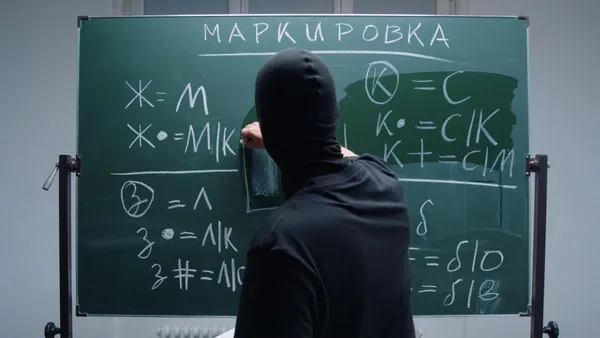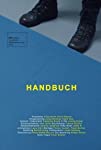Eye For Film >> Movies >> Handbook (2021) Film Review
Handbook
Reviewed by: Andrew Robertson

Tableux vivants in the filmmaker's home. Dimensions, details. His measured voice over that small space, crates turned shelves, the wires of projectors, the cushions in the corner, the white walls. On the computers monitor news footage plays, the protests after the 2020 election in Belarus. This is all prologue before the title. Handbuch.
Pavel Mozhar's film is constructed from testimony. A projector throws diagrams onto the wall. The charts of arrangement within prisoner transports recall the diagrams of slave ships. Stacked like cordwood. Uniforms of black soled plimsolls, blue jeans, tee-shirts as dark as they are nearly green. Four deep, more.
This is the documentation of evil. These are not always the specialist architectures of authority, often instead the dances of dictatorship, the choreography of coercion. The assisted shuffle. The stretch position. Stress positions. The room could be any municipal space, denting skirting boards, pipes thick with paint, outlets empty staring. Black, balaclava, baton, blood pressure, beatings, barbarity. Knees replaced by knives.
Make it clear for the camera. Angles as tight as hospital corners. There's a blue gymnastics mat on the lighter blue linoleum of this floor. There had been wood here, earlier. Recognise the bank of sockets. Those textures do not need to be the roughness of post-Soviet concrete, of diesel powered steel. It is about power. Power exists independent of outlets. Power will find any way to get to ground. The room we are in is the room we have always been in.
The act of filming itself recreation. Blinking red lights, red reticules, the red REC a witness to witnessing. Extension blocks recall prison blocks, the hard drives on the desk like brutalism across the skyline. Reflected in the wet green of the blackboard the anonymous figure chalks something that might be set theory. The K is not for Kafka but this is no less a trial. One figure in black stripped of humanity beats another of black who never had it. Under that metronomic beating on a torso with gaffered stitches comes discussion of "kindnesses". Against the wall.
The markings indicate the lengths of the walls, the water levels indicate the portions. "30 people in that cell was pretty luxurious". This is routine as violence, the procedure of police states. The matter of factness of its tone pulls the black and white from the institutional greys. The slow accumulation of dripping water. The buzz of strong lights. A blink of discomfort from the screen is nothing to the state it is recreating. "there is only a hole between". From actinic white to featureless black.
Ganna Gryniva's sound design is a core component, the measured mix of foley and archive as part of it all as the recontextualisation and testimony and diagrammatic evidence. One noise getting louder in the testimony, one noise becoming quieter. All the more articulate and clear for it.
In a pre-recorded Q&A for Glasgow's 2022 Short Film Festival that was itself impacted by sound issues at least at the local end, Mozhar talked about the complexity of the circumstances talking about the element of 2020's oppressive actions by Lukashenko's actions in Belarus while Russian forces entered Ukraine through that country. He talked about his difficulties with part of his research, reading Peter Weiss' Die Ermittlung a documentary play of testimony from The Holocaust. He talked about having to put that down every few pages, and wanting to avoid creating a film where audiences would walk out. He talked about something "even more horrifying than the beatings", the institutional and procedural elements. He wanted to make clear that the comparison to the Holocaust was not one of scale or otherwise but about the "demonic and horrifying" aspect, the planning of evil actions. To sit at a desk and determine mechanisms of repression, not just the commission but the committee.
He talked about reading interviews in each context, from Belarus and from Weiss' work and the sense that "80%" of it was one interview, the similarity, the rigidity of process. He talked about the hope to travel to Minsk for the film, but how the twin spectres of increased oppression and Covid meant that the risks to himself and others were too great. "just not possible" in a place where a Facebook post or wearing the wrong flag might see one looked up. The requirement to work locally was therefore one of self-preservation as much as the work itself is an act of historical preservation. He talked about NGOs who had interviewed those affected, with access to some two hundred of those he assembled the material that became Handbook. While there are diagrams within it there is a sense that this is not the Handbook itself but the impact from it, a back-formation of interpretation of interpretations.
As with much of the rest of the film, a hope to shoot it in a studio did not work and he walked back from a "maximalist" position to shoot it within his own room. Discussing it with his cinematographer Jonas Romig they came to do so, a test found room. Without the studio it became easier to avoid cinematic tricks, no mean feat with a second cinematographer (Adam Oraf) involved. Yet its simplicity in bringing Belarus to that space is a testament to the work of all involved. It takes a lot to make this kind of document. The simplest line is often the hardest. In a discussion that involved the way that personal space can be re-used and recontextualised I will mention the arrival of the second cat of these remote Q&As. Where space and its perceptions, proximity and its consequences are so important the sudden arrival of that feline and, by extension, alien perspective served as a reminder that the evils here are of human systems, human decisions. The film more than succeeds by itself, but every moment around it gives it fresh context. New legs to stand on, if you will, a new position to stress.
Reviewed on: 27 Mar 2022
















